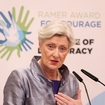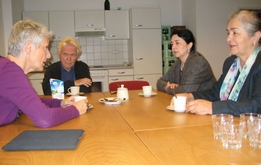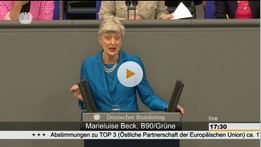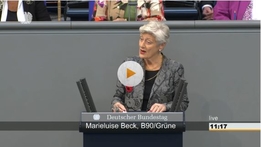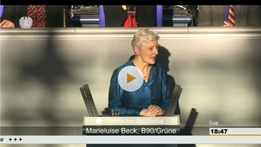Motion tabled by Members of the Bundestag Marieluise Beck, Volker Beck, Birgitt Bender, Dr Uschi Eid, Thilo Hoppe, Ute Koczy, Kerstin Müller, Winfried Nachtwei, Claudia Roth, Rainder Steenblock, Jürgen Trittin and the Alliance 90/The Greens parliamentary group.
The Bundestag is requested to adopt the following motion:
I. The German Bundestag notes:
1. The regime led by Uzbek President Islam Karimov violates human rights systematically and on a massive scale. Democracy and the rule of law do not exist. The Uzbek governments disproportionate and indiscriminate response to the disturbances in Andijan in May made clear the brutality of the actions of the regime in Uzbekistan. Hundreds of demonstrators were killed by the security services. The Uzbek government continues to refuse to allow an independent, international commission of inquiry into the events in Andijan in 2005. The trials against the alleged ringleaders in October and November 2005 were based on confessions extracted under duress. They thus violated all principles of the rule of law. Trials against more than 100 people are still ongoing. These people face up to 20 years in prison. Media reporting in Uzbekistan is one-sided, and access to information sources such as the Internet is limited. Since the events in Andijan, censorship has been stepped up further. Opposition websites and news sites cannot be accessed. Portrayals of the events in Andijan that deviate from the official government line are treated as defamation and punished by law enforcement agencies. In addition, many human rights defenders and members of the opposition are being convicted by the courts. The development of a civil society and a democratic opposition is now all but impossible. The work of both Uzbek and international civil-society organisations is massively obstructed, if not prohibited, by state repression. The UN High Commissioner for Refugees (UNHCR) was forced to leave the country at the beginning of this year, and the Tashkent office of the human rights organisation Human Rights Watch is being hindered in its work. The only German non-governmental organisation still active in Uzbekistan is Deutsche Welthungerhilfe (German Agro Action). In addition, a number of foreign media organisations were forced to leave the country last year. Following the events in Andijan, many people from Uzbekistan fled to neighbouring countries. In Kyrgyzstan and Kazakhstan in particular, many refugees remain in hiding because they fear being deported to Uzbekistan and facing persecution there. There are also believed to be refugees in the Russian Federation and other CIS states. The UNHCR has called on Kazakhstan and Ukraine not to deport any refugees to Uzbekistan. Nonetheless, such deportations are taking place. In a report published in mid-February 2006, the International Crisis Group described Uzbekistan, in view of the disturbances in Andijan and the governments violent reaction, as a threat to the stability of the entire Central Asian region.
2. The international communitys reactions to the events in Andijan were and are very varied in some respects. Following Uzbekistans refusal to allow an independent commission of inquiry into the incidents in Andijan, the EU decided in October 2005 to partially suspend its Partnership and Cooperation Agreement with Uzbekistan and to impose sanctions against individuals within the government responsible for the bloody suppression of the disturbances and for blocking an independent commission of inquiry. In the USA, Congress is discussing a bill calling for sanctions on Uzbekistan similar to those imposed by the EU. The Russian government, by contrast, continues to support President Islam Karimovs regime. In May 2006, President Vladimir Putin demonstrated again his close relationship with Islam Karimov. Islam Karimovs regime can also count on Chinas sympathetic attitude. Immediately after the events in Andijan, China visibly demonstrated at international level its solidarity with Islam Karimovs regime. Uzbekistan is a member of the Organisation for Security and Cooperation in Europe (OSCE). The OSCEs structures offer a mechanism for the cooperative establishment of an independent international commission of inquiry. Islam Karimovs regime has not made use of this possibility. The regime has also refused to assist the OSCE/ODIHR investigation into the events in Andijan. The mandate of the OSCE Centre in Tashkent has been extended only until 30 June 2006, at the insistence of the Uzbek delegation to the OSCE. The Centre is an important actor in the dialogue with the Uzbek government on the one side and civil society on the other.
3. Within the framework of Germanys assumption of the EU Council Presidency in 2007, the Federal Government has announced that it wishes to enter into and develop a partnership with the Central Asian states. In this context, problems relating to human rights and deficiencies in terms of the rule of law in these countries must be comprehensively addressed. The Federal Government, represented by Dr Friedbert Pflüger, Parliamentary State Secretary at the Federal Ministry of Defence, reached agreement with Uzbekistan as early as December 2005 on a dialogue on human rights and democracy. A clear strategy concerning this dialogue is not discernible, however: no targets relating to substance or timeframe have been agreed, nor has it been determined whether representatives of civil society will be involved in this dialogue. Without a concrete plan for the implementation of this project or negotiated targets, this initiative has thus far lacked credibility. A human rights dialogue as a mere fig leaf would, however, send a fatal signal regarding the sincerity of Germanys human rights policy, and would be a wasted opportunity in Germanys dealings with Uzbekistan. Germany is one of few countries still using the only remaining ISAF air base for Afghanistan, Termez, in Uzbekistan. Partly also because of the close bilateral connection resulting from this, the Federal Republic of Germany has a responsibility to promote democracy and the rule of law.
II. The German Bundestag calls on the Federal Government to
1. continue to work, bilaterally and within the framework of the EU and the OSCE, towards the establishment of an independent commission of inquiry;
2. insist, bilaterally in dealings with the Uzbek government, and within the framework of the EU, that the rule of law be observed in the Andijan trials;
3. seek to ensure, bilaterally and within the framework of the EU, that prison conditions in Uzbekistan are significantly improved;
4. support efforts to foster freedom of the press and freedom of opinion in Uzbekistan through projects to train journalists in the region;
5. examine, within the framework of the EU, to what extent satellite and Internet news programmes for Uzbekistan can be supported;
6. seek to ensure the protection of human rights defenders through programmes enabling them to seek refuge in the Federal Republic of Germany at short notice;
7. advance the expansion of targeted scholarship programmes for students from Uzbekistan and Central Asia in the Federal Republic of Germany;
8. call, both bilaterally and within the framework of the EU, for an end to the restrictions and obstructions faced by international and Uzbek non-governmental organisations;
9. seek to ensure that no refugees are deported to Uzbekistan, and to insist that Uzbekistan provide information about those that have already been deported;
10. continue, within the framework of the EU, to observe developments in Uzbekistan and to examine the possibility of a targeted expansion of sanctions;
11. urge the Russian and Chinese governments to use their influence on the President of Uzbekistan to encourage him to allow the work of the independent commission of inquiry called for by the EU;
12. continue to use the OSCE as an important forum for dialogue, and to insist that the mandate of the OSCE Centre in Uzbekistan be extended without restrictions;
13. prioritise the topic of human rights and the promotion of democracy within the framework of the partnership with Central Asia, and to develop a comprehensive strategy on this subject;
14. negotiate concrete targets relating to substance and timeframe for the human rights dialogue with Uzbekistan that has been announced.
Berlin, 28 June 2006
Renate Künast, Fritz Kuhn and parliamentary group of the Alliance 90/The Greens

